 By Stefanie Panke
By Stefanie Panke
Editor, Social Software in Education
Last week 1000 attendees enjoyed three days packed with information and discussion at the 18th Annual TCC Worldwide Online Conference, held from April 16-18, 2013. The acronym TCC stands for Technology, Colleges and Community. Organized by the University of Hawaii, TCC is the oldest running worldwide online conference designed for university and college practitioners. Addressees include faculty, academic support staff, counselors, student services personnel, students, and administrators.
As usual, my review is by no means an authoritative summary but comprises an eclectic collection of talks and topics I found particularly interesting as well as general observations of the conference?s atmosphere and features.
Day 1 (April 16):? Technical Hiccups, Engaging Presenters
TCC 2013 started with the GAU* for an online event: The conference site was down. Surprisingly, the impact was not as devastating as one would think. The social media team quickly rose to the occasion and posted the link to an alternative entry page on Facebook and Twitter. Social Media saved the day!
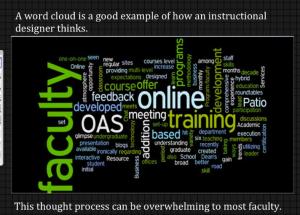
The first session I attended dealt with the question of how to approach the challenge of training faculty in using instructional technologies. Sher Downing, Executive Director for Online Academic Services (OAS) in the School of Business at Arizona State University, presented her strategies in the well-received talk ?Ways to Train Faculty.? To facilitate online learning, the OAS team developed a comprehensive faculty training package that comprises innovative formats such as ?hit the road? one-on-one training in faculty offices, online and interactive training and certification, faculty blogs, faculty roundtables and informal chats ?on the dean?s patio.? Especially the latter seem to be an ideal space for discussing ideas, visions and problems among faculty and instructional designers.
Over the past six month, her instructional support team has seen an increase in faculty participation, a better understanding of course development and meeting student expectations online. Downing stressed the importance of identifying faculty needs through surveys, meetings and informal feedback. My favorite slide was her word cloud visualization of how instructional designers think and how their thought process in return can be overwhelming for faculty. Informal meetings allow for translating between the trend-driven world of educational technology and the realm of the traditional classroom most instructors are familiar with.
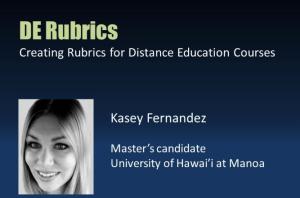
One thing I really enjoy about TCC is the integration of student presentation into the conference program. Often, these presentations are catalysts for discussions that engage new members of the educational technology community as well as seasoned instructors and researchers. A great example is the presentation by Kasey Fernandez on rubrics. In order to help distance educators use rubrics in their courses, Kasey designed an online module to teach the basics of rubrics for distance education as her master thesis project. She evaluated the module with a test group of educational technology graduate students.
In the discussion forum, Kasey motivates other teachers to use rubrics: ?I have used rubrics as a teacher in the face to face setting and as a student in distance education classes. In both settings, I believe that rubrics give students the opportunity to use self assessment to optimize their assignments. As a student, I really appreciate it when my instructors use rubrics.? As participants? comments in the discussion forum show, rubric based assessment is definitely a powerful instructional design tool that we should pay close attention to in research and practice.

- Screenshots: Excerpts from forum discussion on rubrics
In ?Dim the Lights: The ds106 Show,? Alan Levine presented his open course on digital storytelling. The course comprises an open assignment bank that participants populate, a daily creative challenge, and even features an internet-based radio station. To get an idea of the class atmosphere take a look at the TCC preparation session, available in Google Hangout.
A recording of Alan?s presentation is available via Adobe Connect. His ?rant? about MOOCs and the current dystopian visions for online education is worth watching. Alan criticized the stagnant, non-imaginative nature of MOOCs that are offered by MITx or Coursera: ?Typical format: One and a half hour of video lecture, then I get sent to a discussion forum to ?engage? with thousands of people. Everybody is doing the same thing, at the same time.? In contrast, ds106 is driven by the ?Syndication Bus.? Alan explained: ?Participants? experiences are rooted in their own digital space.? The learning products of ds106 are tied together through data feed aggregation, similar to the connectivist course model originally envisioned by Downes, Siemens and others.
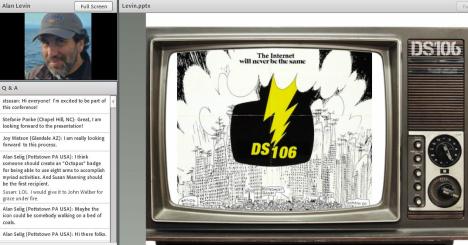
Day 2 (April 17):? From Learning Ecologies to Library Websites to Concept Maps
An interesting opener to the second day was the keynote by Prof. Albert Sangr? from the eLearn research center at Open University of Catalonia (Spain). His talk on ?Learning Ecologies for Lifelong Learning: A Roadmap for Research? outlined challenges of personal learning networks in the traditional academic environment. Again, the recording is freely accessible via Adobe Connect. Prof. Sangr??s talk raised some interesting questions: ?The potential is clear, but how much do we actually learn informally? Which success factors or strategies need to be identified?? He described a mixed-method research project that maps the learning ecologies of primary school teachers in Catalonia. At this stage, the research team has completed in-depth interviews with six teachers. Sangr??s research roadmap envisioned studies on informal learning in different professional sectors, the need to identify best practices and strategies for individuals and institutions, the instructional design of resources and learning paths, assessment, open educational resources and teacher training.
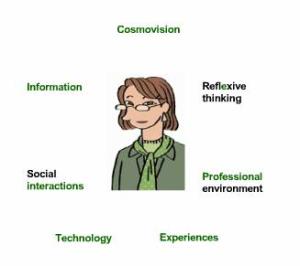
Danilo Baylen, Professor of Instructional Technology at the University of West Georgia, discussed the use of concept maps to support student learning in online courses. He presented and compared three different online services for concept mapping: Prezi, Bubble.Us and SpicyNotes. Using data collected from mapping assignments in a university class, Danilo discussed the challenges of integrating concept mapping tools and assignments into the curriculum of an online course ? it was clear that he was a big fan of mapping. ?I truly believe that concept mapping is a useful tool for students to grasp the big ideas of a unit.?
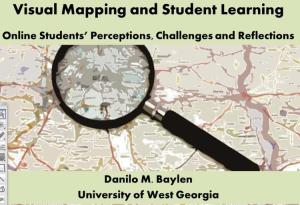
Joseph Dudley is the campus librarian at Bryant & Stratton College. His talk focused on library websites, but I found it very insightful for digital resource management in general. Academic library websites have become major service points for patrons, providing access to catalogs and databases, e-journals and e-book collections, interlibrary loan services, virtual reference resources and even real time assistance from librarians via chat. Joseph stated that ?As a mode of communication, academic library websites are both product and process.?? I asked him to elaborate and he explained his idea as follows: ?The user sees the library portal as a stable product. On the librarian side, however, the site is a process that requires regular maintenance, regardless whether the content is updated or not. On a day-to-day basis, if no new content is publicized, the users will not be aware of the process side.?
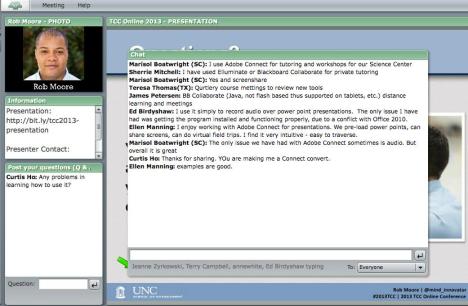
My colleague, Rob Moore, presented the webinars and e-learning modules the instructional design team at UNC School of Government develops with Adobe Connect. He ended his presentation with an open discussion. The participants raised interesting aspects for organizing online learning, for example: ?It?s amazing what we can do with software such as this, but some of us do not have staff to help with developing courses.? I guess the major impediment to me is simply the time it takes to produce content?? and juggling that with other responsibilities? (Ed Birdyshaw).
Day 3 (April 18): All About MOOCs
My last day at TCC was all about MOOCs. Terry Anderson, researcher in the Technology Enhanced Knowledge Research Centre at Athabasca University, focused his talk on the challenges of social interactions and peer-to-peer learning in massive open online courses, open educational resources, and open scholarship. In his presentation, Anderson started out by explaining classical learning theories, i.e., behaviorism, cognitivism and constructivism and used this foil to discuss different types of open learning. I particularly found his visualization of ?social constructivist freedoms? enlightening to understand choices in open course design. The talk is available online.
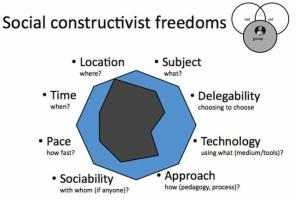
What have we learned about MOOCs and their potential to support learning? Veronica Diaz, associate director at EDUCAUSE Learning Initiative, tried to answer this question by reviewing evaluation data and examples of how MOOCs are being utilized. I was impressed by the evaluation data Diaz pulled from the 2012 Stanford MOOC. It shows the diversity of backgrounds in MOOC participants.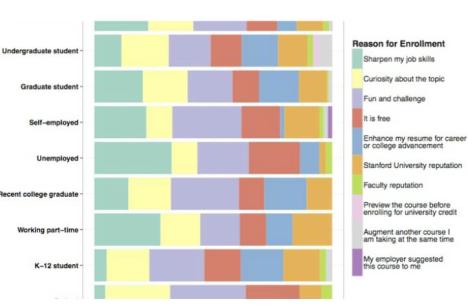
Refreshingly, Diaz?s talk was not a one-way lecture but comprised interactive polls. In the beginning, for instance, she asked participants if they are in the process of creating or adopting MOOCs at their institution. As an idea for future TCCs, it would be great to carry on these conversations in the discussion forum. ?A collection of resources used in the presentation can be accessed via Google Docs. Also, the recording of Diaz? talk is available.
Thoughts About Badges
In our reviews of TCC 2012**, Jessica Knott and I had both praise and critical comments for the idea of badges as an incentive to foster conference activity.
This year, I am sold ? not necessarily to the concept of badges but to the idea of letting conference attendees explore new tools and technologies. Here is why: Several postings by Paula Iaeger convinced me that including this innovative feature had impact beyond the conference itself. Paula said: ?The next week I return to Texas to begin my work on a co-op of highly skilled educators to build a series of badges for our classes and for the general public. To say the TCC Conference was important to me is an understatement.?
Conclusion
Despite technical difficulties on the first day of the conference, TCC 2013 was a great event that brought together students, researchers and practitioners from a variety of backgrounds. Due to the time difference, I was only able to attend a few online sessions live, which made me appreciate the lively well-designed online forum even more. TCC offers opportunities to meet and learn, in synchronous and asynchronous forms.
__________
* Gr??ter Anzunehmender Unfall (worst possible accident, German)
** See Stefanie?s Mahalo TCC 2012: I Have a New Badge?Backpack! and Jess?s The Quest for Badging: My Experiences at TCC?2012.
Like this:
Loading...
Filed under: Uncategorized
Source: http://etcjournal.com/2013/04/23/time-out-at-tcc-2013-how-social-media-saved-the-day/
weather forecast national weather service weather channel Rivals Kaepernick Eddie Vanderdoes puppy bowl
কোন মন্তব্য নেই:
একটি মন্তব্য পোস্ট করুন